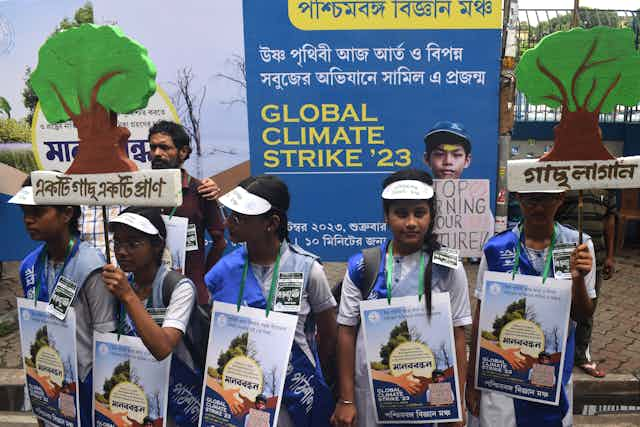The Research Brief is a short take about interesting academic work.
The big idea
Girls in India report being less interested and engaged in politics than boys and cite fewer opportunities to participate in politics, we found in a recent survey of youth across India.
Further, although political interest and engagement was higher for older boys (ages 18-22) than younger boys (ages 14-17), girls’ political interest and engagement stagnated across age groups.
I study young people’s political development, and in the fall of 2022 I collaborated on a study with Indian nonprofit Kuviraa. I am on the advisory board at Kuviraa, which aims to increase girls’ engagement in politics. We used an Instagram ad to survey over 600 youth ages 14-22 who lived in nearly 30 cities across India.
We found that just over half (51%) of boys considered themselves politically engaged compared with less than a third (29%) of girls. We also measured the survey participants’ level of political engagement based on five behaviors, including sharing political posts online, attending rallies and contacting government officials. We found that boys and girls age 17 and under had similar levels of political engagement. However, boys’ engagement became much higher than girls once they were 18 and older.
Further, boys had lower awareness than girls of the structural barriers women face in Indian politics. For example, 74% of the girls surveyed agreed that “it is more difficult in our society for women to become elected officials” compared with 54% of the boys. We found that girls’ awareness was higher with age, whereas boys followed the opposite trajectory, with lower awareness in the older age group.
We also explored possible predictors of youths’ political engagement such as public speaking skills or having a sense that they are able to affect politics. We found that the two significant factors that shaped youths’ political engagement were having parents who discuss politics with their children and parents who encourage their children to engage in politics. The effect was less for girls but still significant.
Finally, we analyzed over 430 open-ended responses to explore how participants explained gender disparities in Indian politics. In these responses, we noticed a pattern: Boys tended to attribute gender disparities in politics to individual women’s choices. “Women don’t take the initiative to stand as a candidate,” one 18-year-old boy explained. Meanwhile, girl respondents tended to emphasize structural forces at play. “It is a common mindset that women should work at home even today,” a 17-year-old girl wrote. “It’s clearly seen even in my family despite their modern mindset.”
Why it matters
Women’s political representation is important to democracy and societal progress. Studies of India’s local councils have shown that having more women political leaders leads to more policies catered to women. More women representatives also improves child health and education indicators and can lead to more lasting peace negotiations.
With India’s general elections coming up in 2024, a conversation about the importance of increasing women’s political representation is particularly timely. India’s Parliament recently passed one of the most progressive bills in any democracy to reserve a third of seats for women. Currently, Indian women vote in high numbers but make up just 14% of Parliament.
What’s next
Our findings suggest that parents simply talking to their children about politics, and encouraging them to engage, can have substantial effects on girls’ political interest and engagement. Yet more resources are needed to teach parents how to have these conversations, particularly with younger children.
It is also critical that boys understand the structural causes of gender inequities in Indian politics. That way they can be enlisted as allies in overcoming obstacles to women’s political engagement.

